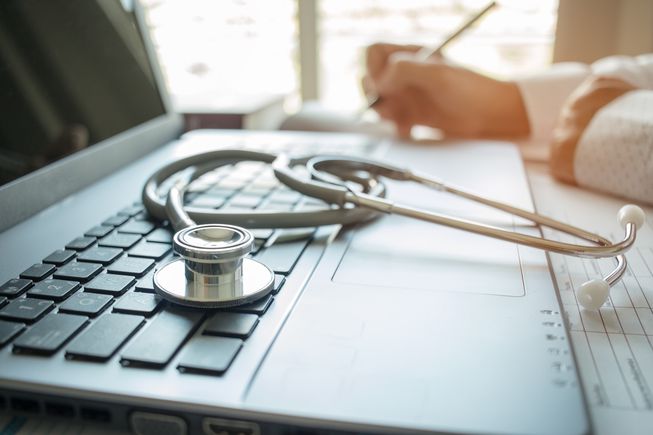大多数时候,谷歌医生并不知道你是什么症状
大多数时候,谷歌医生并不知道你是什么症状
Everyone likes a quick medical diagnosis. And no one delivers one faster than Google. Just rattle off your symptoms in a search window — stiff neck, headache, bit of a fever — and congratulations, you've got . . .. meningitis?
每个人都喜欢快速的医疗诊断。而且没有人能比谷歌更快。只需在搜索窗口中快速说出你的症状——脖子僵硬、头痛、有点发烧——然后恭喜你,你已经……脑膜炎吗?

Google doesn't know as much about your medical history as your doctor. (Photo: smolaw/Shutterstock)
Now you can add heart palpitations and anxiety to your symptoms. But before you Google, "how to make your last will and testament," know this: If there was a real Dr. Google, he would have had his license to practice taken away years ago. Because, as a new study from Australia's Edith Cowan University points out, he's wrong most of the time.
现在你的症状会增加心悸和焦虑。但是在你搜索“如何立遗嘱”之前,要知道:如果有一个真正的谷歌博士,他的行医执照早在几年前就被吊销了。澳大利亚伊迪丝考恩大学的一项新研究指出,因为他大多数时候都是错的。
Publishing their work this month in the Medical Journal of Australia, researchers looked at 36 mobile and web-based symptom checkers. They found the sites were right — producing the correct diagnosis as the first result — a mere 36% of the time. Online symptom checkers were also spotty when it came to finding the right diagnosis within the top three results, with a rate of 52%. For what it's worth, the same sites did manage to get the right diagnosis in their top 10 results 58% of the time.
研究人员本月在《澳大利亚医学杂志》上发表了他们的研究成果。他们发现这些观点是正确的——产生正确的诊断作为第一个结果——只有36%的几率。在线症状检查器在前三名结果中发现正确诊断的几率也不高,为52%。值得注意的是,同样的网站在排名前10的搜索结果中,有58%的结果得到了正确的诊断。
That could be a problem for a society that increasingly leans on Google for health advice. According to the search giant, about 7% of the queries it receives are health-related, which works out to about 70,000 asks-per-minute.
对于一个越来越依赖谷歌提供健康建议的社会来说,这可能是个问题。据这家搜索巨头说,它收到的查询中约7%是与健康有关的,相当于每分钟约7万个问题。
And the answers are mostly wrong.
答案大多是错误的。
"While it may be tempting to use these tools to find out what may be causing your symptoms, most of the time they are unreliable at best and can be dangerous at worst," lead author Michela Hill, a Master's student at Edith Cowan University, notes in a press release.
伊迪丝考恩大学的硕士研究生、该研究的主要作者Michela Hill在一份新闻稿中指出:“虽然使用这些工具来找出可能导致症状的原因可能很诱人,但大多数情况下,这些工具往好了说是不可靠的,往坏了说是危险的。”
The most popular health sites — identified by researchers using, surprise, surprise, Google search — simply don't know enough facts about the patient in question to make an accurate diagnosis, foremost among them, our medical history.
最受欢迎的健康网站——由研究人员使用“惊喜”、“惊喜”、“谷歌搜索”来识别——根本不了解有关病人的足够事实,无法做出准确的诊断,其中最重要的是我们的病史。
And, since the sites don't carry a disclaimer like, "For entertainment purposes only," users are frequently left with a false sense of security, or — depending on the diagnosis — anxiety.
而且,由于这些网站没有“仅供娱乐用途”这样的免责声明,用户经常会产生一种错误的安全感,或者——取决于诊断结果的——焦虑。
In fact, the only diagnosis Doc Google gets right 100% of the time is cyberchondria — a condition that has us turning to Google for medical advice that often makes us feel even worse.
事实上,谷歌医生唯一100%正确的诊断是上网疑病症——这种情况会让我们求助于谷歌寻求医疗建议,这通常会让我们感觉更糟。
"We've all been guilty of being 'cyberchondriacs' and googling at the first sign of a niggle or headache," Hill explains. "But the reality is these websites and apps should be viewed very cautiously as they do not look at the whole picture — they don't know your medical history or other symptoms.
希尔解释说:“我们都曾为自己是‘网络疑病症患者’而感到内疚,一有轻微症状或头痛的迹象就上网搜索。”“但现实情况是,这些网站和应用程序应该被非常谨慎地看待,因为它们并不全面——它们不了解你的病史或其他症状。”
"For people who lack health knowledge, they may think the advice they're given is accurate or that their condition is not serious when it may be."
“对于缺乏健康知识的人来说,他们可能会认为他们得到的建议是正确的,或者他们的病情可能并不严重。”
There's also the question of how exactly these sites formulate a diagnosis, especially considering they're not regulated or even monitored by government bodies.
还有一个问题是,这些网站究竟是如何制定诊断方案的,尤其是考虑到它们不受政府机构的监管,甚至不受政府机构的监控。
"There is no real transparency or validation around how these sites are acquiring their data," Hill adds.
“这些网站获取数据的方式没有真正的透明度或有效性,”希尔补充道。
That's not to say online symptoms checkers don't play a role in the health of a society. As a means of monitoring viral outbreaks, they're already proving instrumental.
这并不是说在线症状检查器没有在社会健康中发挥作用。作为监测病毒爆发的一种手段,它们已经被证明是有用的。
"We're also seeing symptom checkers being used to good effect with the current COVID-19 pandemic," Hill explains. "For example, the UK's National Health Service is using these tools to monitor symptoms and potential 'hot spot' locations for this disease on a national basis."
希尔解释说:“我们还看到,在当前的COVID-19大流行中,症状检测仪发挥了良好的作用。”“例如,英国国家卫生服务正在使用这些工具来监测全国范围内这种疾病的症状和潜在的‘热点’位置。”
But if you're experiencing real pain or discomfort, the best advice Doc Google could offer would be to go and see a real doctor.
但如果你真的感到疼痛或不适,谷歌医生能给你的最好建议就是去看真正的医生。
- 频道推荐
- |
- 全站推荐
- 推荐下载
- 网站推荐


















